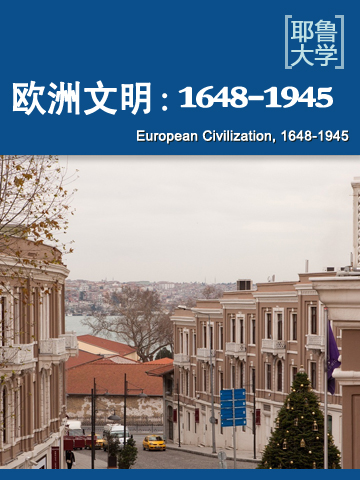既有对欧洲近代史的抽象把握,又有真实的事例还原历史面貌。
本课程概述了从三十年战争到第二次世界大战结束这段时间的欧洲近代史,通过审视人口变化、政治革命与文化发展之间的复杂关系等多种角度分析如法国大革命等重大事件,也聚焦了普通人在此动乱时期的经历。本课既能加强读者对欧洲近代史的抽象把握,又用真实的事例展现历史时期的特点,增强了读者对其的感性认识。
This course offers a broad survey of modern European history, from the end of the Thirty Years' War to the aftermath of World War II. Along with the consideration of major events and figures such as the French Revolution and Napoleon, attention will be paid to the experience of ordinary people in times of upheaval and transition. The period will thus be viewed neither in terms of historical inevitability nor as a procession of great men, but rather through the lens of the complex interrelations between demographic change, political revolution, and cultural development.
- 第1课 简介
- 第2课 绝对主义和国家
- 第3课 例外的荷兰和英国
- 第4课 彼得大帝
- 第5课 启蒙运动和公共领域
- 第6课 罗伯斯庇尔和法国大革命
- 第7课 拿破仑
- 第8课 工业革命
- 第9课 中产阶级
- 第10课 公众抗议
- 第11课 1848年英国没有爆发革命的原因
- 第12课 十九世纪的城市发展
- 第13课 民族主义
- 第14课 激进分子
- 第15课 帝国主义和童子军
- 第16课 第一次世界大战的到来
- 第17课 战壕里的战争
- 第18课 纪念碑,哀悼地
- 第19课 俄国革命
- 第20课 东欧的后继者
- Lecture 1 Introduction
- Lecture 2 Absolutism and the State
- Lecture 3 Dutch and British Exceptionalism
- Lecture 4 Peter the Great
- Lecture 5 The Enlightenment and the Public Sphere
- Lecture 6 Maximilien Robespierre and the French Revolution
- Lecture 7 Napoleon
- Lecture 8 Industrial Revolutions
- Lecture 9 Middle Classes
- Lecture 10 Popular Protest
- Lecture 11 Why No Revolution in 1848 in Britain
- Lecture 12 Nineteenth-Century Cities
- Lecture 13 Nationalism
- Lecture 14 Radicals
- Lecture 15 Imperialists and Boy Scouts
- Lecture 16 - The Coming of the Great War
- Lecture 17 - War in the Trenches
- Lecture 18 - Sites of Memory, Sites of Mourning
- Lecture 19 - The Romanovs and the Russian Revolution
- Lecture 20 Successor States of Eastern Europe





















20190517054431262956.jpg)

 京公网安备 11010802032529号
京公网安备 11010802032529号
笔记加载中...